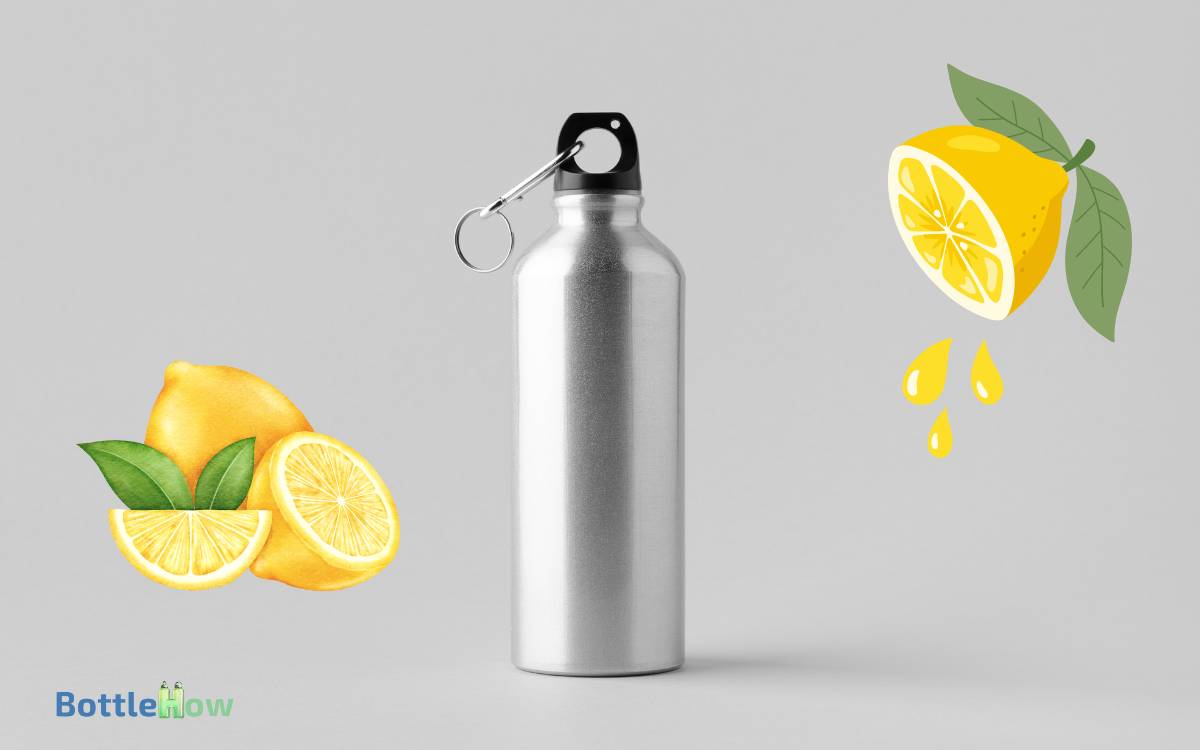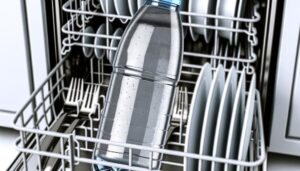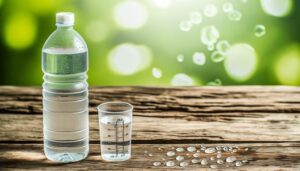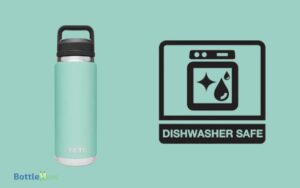Can You Put Lemon in a Metal Water Bottle? Yes!
You can put lemon in a metal water bottle, but be cautious about the type of metal. High-quality stainless steel bottles are generally safe and resistant to corrosion.
On the other hand, aluminum bottles, unless they have a non-reactive lining, may react with the lemon’s acidity, leading to corrosion and potential health risks. Copper bottles also react with acids and should be avoided for lemon water.
To guarantee safety and longevity, consider alternatives like glass or BPA-free plastic bottles. Dive deeper to learn more about material choices and their implications.

Key Takeaways
Acidity of Lemons
Lemons are highly acidic, with their pH typically ranging from 2 to 3. This level of acidity is due to the high concentration of citric acid found in the fruit.
When you add lemon juice to water, it markedly lowers the pH of the solution. Understanding the implications of this acidity is crucial, especially when considering using a metal water bottle.
Different metals react differently to acidic substances, and prolonged exposure can lead to potential corrosion. Although stainless steel is generally more resistant to acidic environments, it’s not entirely immune.
Hence, you should be cautious when adding lemon to your water, particularly if you plan on storing it for extended periods in a metal container.
Types of Metal Water Bottles
Understanding the characteristics and suitability of different materials like stainless steel, aluminum, and copper is essential when selecting a metal water bottle. Each type offers unique benefits and potential drawbacks.
- Stainless Steel: Known for its durability and resistance to corrosion, it’s generally safe for acidic beverages.
- Aluminum: Lightweight and often coated with a protective layer, but the coating’s integrity is important to prevent reactions with acidic liquids.
- Copper: Praised for its antimicrobial properties, though it can react with acidic substances, potentially leading to undesirable tastes or health concerns.
Choosing the right metal bottle involves weighing these factors carefully. Always make sure the material is suitable for your needs, especially if you plan to add acidic ingredients like lemon.
Stainless Steel Bottles
When you put lemon in a stainless steel bottle, the acidity of the lemon can interact with the metal.
However, stainless steel is known for its corrosion resistance properties, which generally prevent it from reacting negatively.
It’s important to review any specific manufacturer guidelines regarding acidic contents to guarantee the longevity of your bottle.
Lemon Acidity Impact
Although stainless steel is generally resistant to corrosion, you should be cautious because the acidity of lemon can gradually wear down the protective layer over time. This erosion mightn’t be apparent immediately, but long-term exposure can lead to subtle changes.
Microscopic Pitting: Tiny pits can form on the surface, making it more susceptible to further damage.
Metallic Taste: You might notice a slight metallic taste in your water, indicating the protective layer is compromised.
Discoloration: Over time, the interior of your bottle could develop a discolored appearance due to the acidic interaction.
Corrosion Resistance Properties
Stainless steel bottles offer significant corrosion resistance due to their chromium-rich oxide layer. This layer acts as a barrier, protecting the underlying metal from rust and degradation.
When you put lemon juice in a stainless steel bottle, the acidity from the lemon interacts with this protective layer.
However, high-quality stainless steel, typically 18/8 or 304 grade, is designed to withstand such acidic conditions without compromising its integrity.
It’s important to note that not all stainless steel bottles are created equal. Lower-quality stainless steel may have less chromium, making it more susceptible to corrosion.
So, always check the grade of stainless steel when considering using acidic substances like lemon juice. This ensures your bottle remains durable and safe for repeated use.
Aluminum Bottles
Frequently, aluminum water bottles are praised for their lightweight and durable characteristics. You’ll find them convenient for daily use, whether you’re at the gym, hiking, or just heading to work.
They offer several advantages:
- Lightweight: Easy to carry around without adding much weight to your bag.
- Durable: Resistant to breaking, making them a long-lasting choice.
- Eco-friendly: Reusable and recyclable, reducing environmental impact.
However, it’s important to be cautious when using aluminum bottles for acidic beverages like lemon water.
While they provide many benefits, the interaction between aluminum and acidic liquids can be complex.
Always consider the specific properties of the material and any potential coatings that might be present to guarantee safe usage.
Reaction Between Acid and Metal
Understanding how acidic beverages like lemon water react with metal is essential for ensuring your drink’s safety and bottle’s longevity. Acidic substances, like lemon juice, can cause corrosion in certain metals.
When lemon water comes into contact with metals such as aluminum or low-grade stainless steel, it may lead to a chemical reaction.
This reaction can release metallic ions into your drink, potentially altering its taste and quality. Corrosion also weakens the structural integrity of your bottle over time.
High-quality stainless steel bottles, typically labeled as food-grade 18/8 or 304, are more resistant to corrosion, making them a safer choice.
Always verify the type of metal your bottle is made from to prevent any unwanted reactions.
Health Risks
When you put lemon in a metal water bottle, you should be aware of potential health risks. Acidic liquids like lemon juice can cause metal corrosion, possibly leading to chemical leaching.
These chemicals might contaminate your drink, posing health concerns.
Metal Corrosion Concerns
Taking lemon in a metal water bottle can lead to corrosion, which poses potential health risks due to the leaching of metals into your drink.
The acidic nature of lemon accelerates the corrosion process in certain metals, such as aluminum and low-grade stainless steel.
This corrosion can result in harmful substances entering your water, which could affect your health over time.
- Increase in Metal Ions: Corrosion can release metal ions like aluminum or nickel into your drink.
- Taste Alteration: The presence of corroded metals can alter the taste, making your water taste metallic.
- Long-term Health Risks: Regularly consuming metal-contaminated water could lead to various health issues, including gastrointestinal problems.
Considering these points, it’s vital to be cautious about using metal bottles with acidic contents.
Chemical Leaching Risks
Chemical leaching from metal water bottles can introduce harmful substances into your drink, posing significant health risks. Over time, exposure to heat and acidic liquids may accelerate this leaching process, increasing the chances of contamination. Consumers often wonder, can water spoil in metal bottles, especially if stored for long periods; while water itself doesn’t spoil, bacterial growth and chemical reactions with the metal can affect its safety. To minimize risks, it’s essential to choose high-quality, food-grade metal bottles and clean them regularly.
When you add lemon, its acidity can accelerate this process, leading to the release of metals such as aluminum, nickel, or chromium.
Studies indicate that prolonged exposure to these metals can cause various health issues, including digestive problems, neurological disorders, and even cancer.
It’s essential to know that not all metal bottles leach chemicals. Stainless steel bottles are generally safer, but even they can corrode over time if constantly exposed to acidic substances.
To minimize risks, consider using bottles specifically designed to resist acidic corrosion or opt for glass or BPA-free plastic alternatives.
Always prioritize your health by making informed choices.
Taste Impact
Adding lemon to a metal water bottle can subtly alter the taste of the water, often imparting a faint metallic flavor.
This effect varies depending on the type of metal and the acidity of the lemon. Studies suggest that acidic beverages can interact with metals, potentially affecting taste.
- Stainless Steel Bottles: Less likely to impart a strong metallic taste but still noticeable.
- Aluminum Bottles: More prone to altering taste unless lined with a protective coating.
- Copper Bottles: Can meaningfully change the flavor due to higher reactivity with acids.
It’s essential to understand these interactions so you can make an informed decision. While some users may not detect a noticeable difference, others might find the metallic tang undesirable.
Longevity of Metal Bottles
When considering the longevity of metal water bottles, it’s important to evaluate factors like material durability, maintenance routines, and the impact of acidic beverages.
Most metal water bottles are made from stainless steel or aluminum, both known for their durability.
However, frequent exposure to acidic substances, like lemon juice, can potentially weaken the inner lining over time. This can lead to corrosion or a metallic taste.
Regularly inspect your bottle for any signs of wear or damage. Furthermore, certain metal bottles come with protective coatings designed to resist acidic erosion.
Understanding these aspects will help you make informed choices to maximize your bottle’s lifespan. Always prioritize high-quality materials and be cautious with acidic beverages.
Cleaning and Maintenance
When you use lemon in your metal water bottle, it’s important to prevent stains and odors by cleaning it regularly.
Make sure you dry the bottle properly to avoid mold and rust, and use safe cleaning solutions like diluted vinegar or baking soda.
These steps will help maintain your bottle’s longevity and safety.
Preventing Stains and Odors
Regular cleaning is essential to prevent stains and odors when using a metal water bottle for lemon-infused water.
The acidity of lemon can interact with metal, potentially leading to discoloration and lingering smells. To keep your bottle fresh, follow a strict cleaning routine.
- Use baking soda and warm water: Mixing these creates a gentle scrub that can neutralize odors and remove stains.
- Vinegar rinse: Fill your bottle with a diluted vinegar solution, let it sit for about 15 minutes, and rinse thoroughly.
- Bottle brush: Use a brush to reach all interior surfaces, ensuring no residue remains.
Proper Drying Techniques
How can you guarantee your metal water bottle stays moisture-free and hygienic after cleaning? Start by shaking out any excess water.
Use a clean, dry cloth to wipe the interior and exterior thoroughly. Confirm the bottle is completely dry by leaving it upside down in a well-ventilated area.
Here’s a quick drying checklist for your convenience:
| Task | Tools Needed | Emotional Impact |
|---|---|---|
| Shake out excess water | Just the bottle | Feel confident |
| Wipe with dry cloth | Clean, dry cloth | Feel responsible |
| Leave upside down | Drying rack | Feel accomplished |
| Ensure ventilation | Open space | Feel relieved |
Safe Cleaning Solutions
Selecting the correct cleaning solutions for your metal water bottle guarantees it stays safe and hygienic for daily use.
You should avoid harsh chemicals that could damage the bottle or leave harmful residues. Instead, use gentle and effective options.
- Warm soapy water: This is a simple and reliable method for everyday cleaning.
- White vinegar: Dilute with water for a natural disinfectant that removes odors and buildup.
- Baking soda: Mix with water to create a paste for scrubbing away stubborn stains and residues.
These solutions are safe and won’t safeguard the integrity of your metal water bottle. Regular cleaning with these methods safeguards your bottle remains in top condition, ready for your next hydration session.
Benefits of Lemon Water
Lemon water can provide an important dose of vitamin C, which supports your immune system and overall health.
Drinking lemon water may also aid digestion by stimulating stomach acid production, potentially improving nutrient absorption.
Additionally, the citric acid in lemons might help prevent kidney stones by increasing urine volume and pH.
Some studies suggest that the antioxidants in lemon water could help reduce inflammation and promote skin health.
However, it’s essential to consume lemon water in moderation, as excessive intake might erode tooth enamel due to its acidity.
Always consult with a healthcare provider before making significant changes to your diet, especially if you have existing health conditions.
Alternative Bottles
When considering alternative bottles for your lemon water, it’s important to evaluate materials that won’t react with the acidic content of the lemon.
Glass bottles are a top choice due to their non-reactive nature, guaranteeing no unwanted flavors or chemicals leach into your drink.
BPA-free plastic bottles offer a lightweight and durable option, though they might retain odors over time.
Stainless steel bottles with a protective coating are another viable choice, provided they’re designed to resist acidic corrosion.
- Glass Bottles: Non-reactive, flavor-neutral, and easy to clean.
- BPA-Free Plastic Bottles: Lightweight, durable, but may hold odors.
- Coated Stainless Steel Bottles: Resistant to corrosion, sturdy, but ensure proper coating.
Choosing the right material ensures your lemon water stays both safe and invigorating.
User Experiences
Many users report that their choice of water bottle greatly impacts both the taste and safety of their lemon water.
Stainless steel bottles are popular, but some users note a metallic taste when lemon is added. Others haven’t experienced this issue, suggesting it may hinge on the bottle’s quality.
Aluminum bottles with a lining can be a concern; if the lining wears off, it might react with the lemon, potentially releasing harmful substances. Glass and BPA-free plastic bottles tend to be preferred by those who prioritize taste and safety.
User experiences indicate that reactions vary, so it’s vital to take into account your specific bottle’s material and condition before adding lemon to your water.
Expert Recommendations
Experts strongly recommend considering the material composition of your water bottle to guarantee both the safety and taste quality of your lemon-infused water.
Stainless steel bottles are generally safe as they resist corrosion and don’t react with the acidity of lemon.
However, experts caution against using aluminum bottles unless they’re lined with a non-reactive coating. Unlined aluminum can leach into your drink, affecting taste and safety.
To guarantee the best experience, follow these guidelines:
- Stainless steel bottles: Ideal for lemon water due to their non-reactive nature.
- Aluminum bottles with liners: Safe, provided the liner is intact and undamaged.
- Avoid plain aluminum: Can react with lemon, potentially causing health issues and altering taste.
Choose wisely for optimum health and flavor.
Conclusion
Just as a sword may rust when exposed to the elements, your metal water bottle can react to the acidity of lemon.
While stainless steel stands strong like a knight’s armor, aluminum may corrode like a fragile relic.
Opt for stainless steel to enjoy lemon water without worries. Remember, the tales of others and expert advice are your guiding stars. Choose wisely, ensuring your vessel withstands the test of time and nature.






